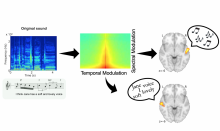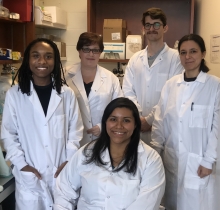The McGill Sustainability Systems Initiative has just funded six new projects through the 2020 Innovation Fund. These one-year projects from Law, Science and Engineering were selected for their potential-for-impact on sustainability challenges. The recipients of this year’s funding, our third Innovation Fund to date, are below. You can see projects funded through previous calls here.

Study suggests humans have developed complementary neural systems in each hemisphere for auditory stimuli
Speech and music are two fundamentally human activities that are decoded in different brain hemispheres. A new study used a unique approach to reveal why this specialization exists.

In the run-up to the 2016 U.S. presidential election, an unusual experiment suggested that it might be possible to influence American voters to adopt less polarized positions.
Posing as political researchers, a research team from McGill and Lund Universities approached 136 voters at the first Donald Trump and Hilary Clinton presidential debate in New York. Participants were asked to compare Trump and Clinton on various leadership traits (such as courage, vision, and analytic skills) by putting an X on a sliding scale.

Award funding gives students lab time, research experience and the chance to discover the right path
...Supported by a Schulich Graduate Fellowship, doctoral student Bikram Poudel is working to improve one of the world’s most important food crops.
Using a new microscopic "fishing" technique, scientists from the Montreal Clinical Research Institute (IRCM), Université de Montréal and McGill University have successfully snagged thousands of proteins that play a key role in the formation of the cell skeletons or cytoskeletons. Cell skeletons, whose primary function is to give the cells their shapes, are also involved in things like muscle contraction. They are made up of an interlocking network of protein filaments that connect the cell nucleus to the cell membrane.
CIFAR today announced its newest cohort of Canada CIFAR AI Chairs, which includes nine researchers from McGill, bringing the total number of McGill researchers named to the program to 17. These top academic researchers are part of the $125 million Pan-Canadian AI Strategy, the world’s first national strategy of its kind. The Canada CIFAR AI Chair Program represents an investment of $30 million at nine universities, and mobilizes over 150 researchers across the country.
The latest group of McGill professors to join Mila as Canada CIFAR AI Chairs in the Arts are:
Cities and their rising impacts on biodiversity versity. To gain a clearer picture of the situation, an international group of scientists, including Professor Andrew Gonzalez from McGill’s Biology Department, surveyed over 600 studies on the impacts of urban growth on biodiversity. They published their findings today in Nature Sustainability.

Kudos to the Prager-Khoutorsky lab for publishing their first paper, Effects of Salt Loading on the Organization of Microtubules in Rat Magnocellular Vasopressin Neurons, in the Journal of Neuroendocrinology. Special congratulations to Amirah-Iman Hicks, graduate student, and Zsuzsanna Barad, post-doctoral fellow, the co-first authors of the paper. Well done!
To view the paper, click here.

Old habits are hard to break. A McGill-led study of replacement of traditional wood and coal burning stoves with clean energy in China suggests that, without a better understanding of the reasons behind people’s reluctance to give up traditional stoves, it will be difficult for policies in China and elsewhere in the world to succeed in encouraging this shift towards clean energy. The study was published recently in Nature Sustainability.

In the world of research, one of the most meaningful measures of success is the number of times a paper has been cited by another researcher. Based on this yardstick, McGill researchers are among the most influential in the world, according to the respected research news website, Web of Science. The annual list identifies scientists and social scientists who produced multiple papers ranking in the top 1% by citations for their field and year of publication, demonstrating significant research influence among their peers.

Student researcher pieces together satellite data to help communities monitor wildfires
Morgan Crowley’s interest in sustainability took root early.
As a schoolchild in New Hampshire, she went to summer camp on Pine Mountain – so named for the stately evergreens that used to blanket the site. By the time Morgan started going there, “there were only two pines left” because the rest had fallen victim to a forest fire or to logging. As a result, “I grew up thinking very much about ecological sustainability.”

In the third installment of National Geographic’s “Into Water” 360 series, canoe through the sprawling Canadian wilderness with freshwater ecologist and National Geographic Explorer Dalal Hanna [Ph.D. candidate NRS (Bennett)]. She researches Quebec’s extensive freshwater systems, collecting samples from streams, rivers and lakes to assess ecosystem health, with the aim of protecting these precious resources. “Into Water: Canada” is the third stop on an around the world 360 tour that documents the work of female Explorers who’ve dedicated their careers to water related issues.
Music, including songs with words, appears to be a universal phenomenon according to a paper published this week in Science. An international team of researchers involving musicians, data scientists, psychologists, political scientists and linguists, including one from McGill University, reached this conclusion after five years of collaboration, bringing together a broad range of skills and tools to the question of whether music is universal.
Using broad datasets to arrive at deep conclusions about music
On October 22nd, Montreal City Council members came to a mutual research agreement between the City and the Centre for Interdisciplinary Research on Montreal (CIRM) for the realization of a project regarding the implementation of the Politique de l’enfant’s five intervention axes “Naître, grandir, s’épanouir à Montréal: de l’enfant à l’adolescence”.
Once again, we are approaching the annual NAPCRG (North American Primary Care Research Group) conference where we have traditionally had a very strong turn out by our McGill Department of Family Medicine!
Again this year, we are pleased to include a modified schedule that highlights all of our student and Faculty presentations.
If you are attending NAPCRG, don’t forget to stop by the department’s table!
